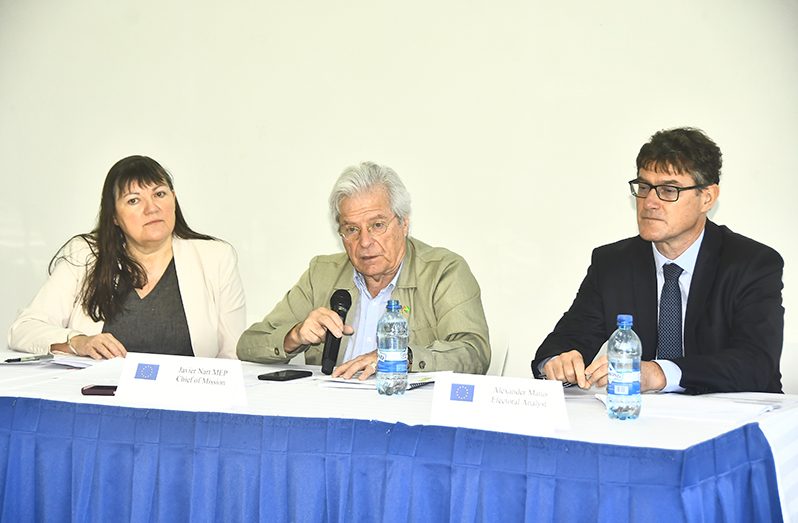AMENDMENTS to Representation of the People Act (ROPA), the National Registration Act, and the tabling of the Data Protection Bill have represented significant work on some of the critical priority areas in the electoral reform recommendations that was made in the Final Report by the European Observation Mission that appraised Guyana’s 2020 Regional and General Elections.
However, much work remains to be done on campaign financing limitations and disclosure, use of state assets, and equity in the state media coverage.
This is according to a group of electoral experts from the European Union (EU) currently in Guyana assessing progress made on the 26 recommendations made in the Final Report.
Chief of Mission of the group is a member of the European Parliament, Javier Nart, while the team also includes Team Leader-Electoral Analyst, Alexander Matus and Legal Expert, Anne Malborough.
Speaking at a press conference on Wednesday at the Pegasus Suites and Corporate Centre, Matus noted that, by early July, the delegation is expected to publish a detailed final report on their assessment of the progress made on implementing the 26 recommendations. However, he was keen to note that some of the recommendations cannot be implemented at this time.
“The mission will publish the final report in about one month’s time [after completing the assessment]. In the final report, we will have a detailed assessment of all 26 recommendations, which will be categorised into several categories such as ‘fully implemented’, ‘partially implemented’, ‘activity ongoing’, there would be another category for ‘too early in the elections cycle to determine’ because there are some recommendations which can only be assessed shortly before elections period itself. You cannot assess it at such an early time,” Matus related.
Of the 26 recommendations listed in the 2020 final report, eight were classified as priority areas. Of these eight, significant progress has been made in four of the areas, with two being fully implemented through provisions in amendments made last year to ROPA and the NRA.
“One dealt with the clear tabulation. This has been taken care of by one of the provisions in the ROPA [which outlines] very clear written procedures on how to tabulate the results of the elections from step one to the final announcement of the results,” Matus related.
“Second priority recommendation called for increased transparency in the result process, namely to publish the Statement of Polls as soon as possible on GEOCM website, which has also been addressed because the new law requires the Returning Officers to immediately on receipt of the SOPs make them publicly available on the GECOM website. These are two priority recommendations which are addressed in full.”
Other recommendations which have been partially addressed include increasing the continuous voter registration aspect.
“This is being addressed by the National Registration Amendment Act which extends the period during which people can register for the first time or make changes. According to the new provision, GECOM offices are open to the public ten months per year,” Matus said.
“The other recommendation where we see some progress is the recommendation suggesting the adoption of the Data Protection Act. And we are aware that the Data Protection Bill was recently tabled by the government in the National Assembly, and there is a call for comments and submissions to comment on the law.”
Legal Expert, Anne Malborough, noted that another area where the government is also making moves to address recommendations is the consolidation of the election laws.
In the EU final report, the second recommendation, and first priority recommendation, noted that the fragmented nature of laws surrounding elections in Guyana created significant inconsistencies and legal uncertainty; as such the report said that there is a need to “review and consolidate the fragmented election legislation to strengthen legal clarity and certainty”.
Malborough shared that, in conversations with the government, it was noted that moves are actually being made to address this.
“We were told that the project is now underway by the government. There is a project underway to consolidate the law. A professional company is trying to group together the laws so that they are harmononised,” Malborough shared.
However, both Malborough and Nart noted the need for provisions from global conventions to be incorporated into domestic legislation, which was the first recommendation made in the 2020 report. This includes provisions from the Convention on the Rights of Persons with Disabilities (CRPD), International Convention on the Rights of All Migrant Workers and their Families (ICRMW), United Nations Convention against Corruption (UNCAC) and the Inter-American Convention against Corruption (IACAC).
For Nart, he believes that better regulations on campaign financing should be a high priority, with emphasis on spending limitations and donor clarity.
“What comes with financing is accountability. It is very very important. When a party goes to election and have no limit of spending it is like running against a rabbit, against someone on feet. Who is going to win? Of course, the rabbit. We have to have an equal playing field, so the spending has to have a limit,” Nart conveyed.
“Also important is who is giving this money. Companies and society are based on business and business means profit. When financing is dark, you don’t know who is financing. And {without limitations] the level is you can spend as much as you can. Accountability and limiting the spending, this is absolutely capital to have a quality in elections day.”
Nart also cautioned against the abuse of state assets for matters relating to the political party and better media monitoring.
The team trod with caution on controversial elections matters such as the use of biometrics for voting, and how the country should deal with the voters’ list, particularly concerning the need for provisions for Guyanese who are overseas to still be able to register and vote.
“You cannot work anything without good faith, political will and trust. The decisions that have to be taken it’s not for anyone to say how much can I get from this, but how much inclusiveness and stability we can get from our camaraderie,” Nart noted.
Wednesday’s press conference came one day after the team would’ve had had a round table discussion with 30 stakeholders. The team would have been in Guyana since May 7 carrying out surveys and investigations and is expected to remain in Guyana for another 10 days.
The team has been meeting with members of the governing political party as well as the main political opposition, Guyana Elections Commission (GECOM), civil society and other related stakeholders.








.png)







